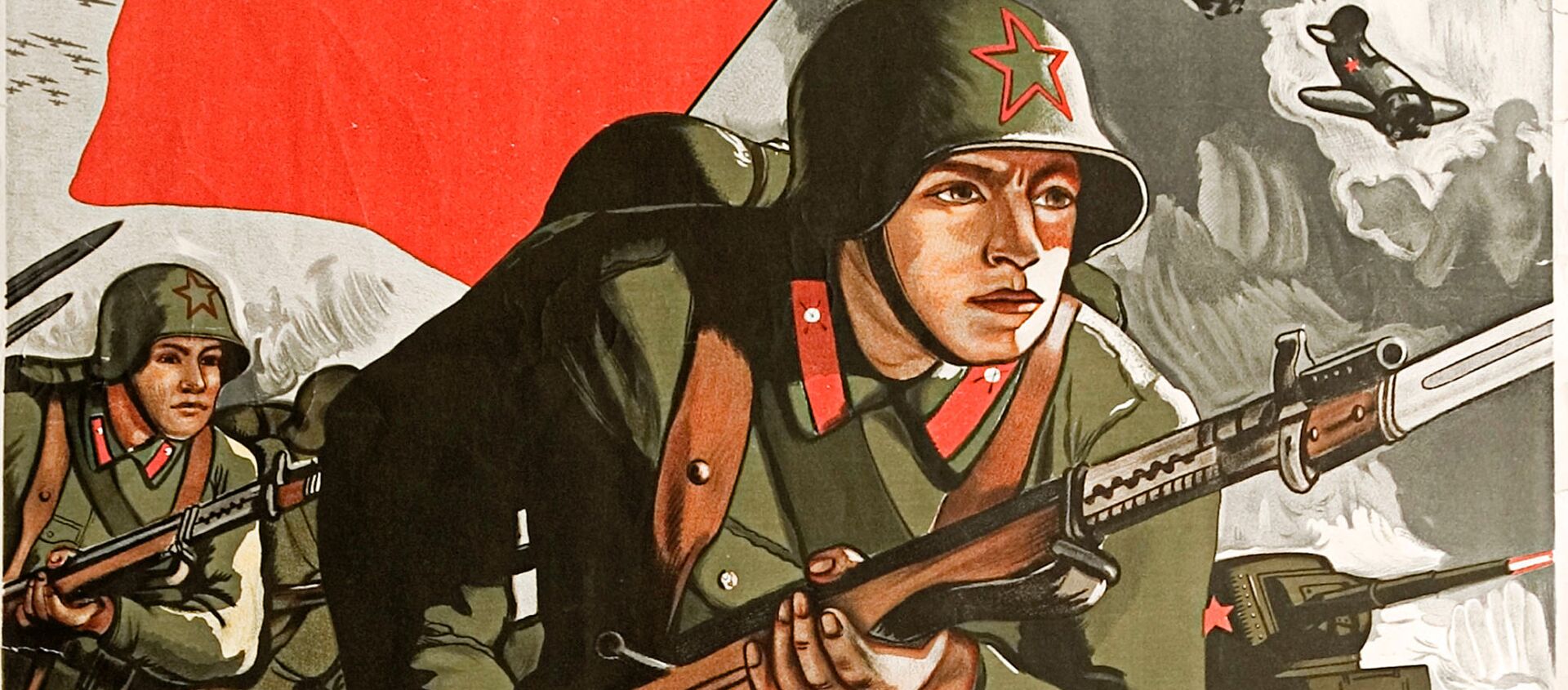Everybody Lives But Me?
15:37 GMT 07.07.2023 (Updated: 09:44 GMT 09.07.2023)

© AP Photo / Marina Lystseva
Subscribe
By Konstantin Bogomolov, theater director, poet, actor, art director of the Theater on Malaya Bronnaya in Moscow
They have left. A variety of people. Very much unlike one another. Some left instantly, others some time later. Some left because they feared persecution, others were just scared. Some of them made a bet. Others are plugging away.
Still others are in a stupor. Some of them are “serving” different masters. Others are giving interviews with varying degrees of sincerity.
Some left for good, others left for a short time. However, the “short timers” have over time started looking more like “forever.” They left behind their apartments. Older relatives. Animals. Work. Friends. Plants that need watering. Dusty books.
This text is not about the reasons, which are countless. This text is about one consequence that is common for almost all of them. It is an attempt to figure out an ugly something that has overcome many new Russian emigrants commonly known as “relocants.” Not all of them, no. Some have a strong enough immunity to repel the virus. But it’s an epidemic nonetheless.
This disease attacks the brain, the mind, and even the body. In terms of external appearance and energetic attributes, it is like age-related changes. It’s hard to tell what’s wrong with a person just by looking at him/her.
It’s as if facial features have changed. Or is it a case of plastic surgery that went wrong?
A psychologist would say it’s a case of age-related depression. Family, children, and work have worn a person down. Crisis. More drinks than usual, more complaints than ever. Exasperation. Bitterness and lecturing other people. Lack of irony which is a typical consequence of a heart attack. But there was no heart attack, unless leaving the country counts. Should that count?
The problem is that these signs are found in young men and women who have not yet entered the age when moralizing the world at large becomes a dominant need. Just like women of advanced age look down on young girls, branding them all as persons of low moral character just because they are young. In the same way, the Russian emigrant looks back with disgust at the Russians who stayed behind without remorse. They stayed behind in their homeland, they live, work, have babies and continue to make plans for the future.
Looking through the social media windows at young residents of Moscow, Omsk, Perm, Novosibirsk, and other cities on their way to work, angry grannies (relocants) have the following to say: “Here he/she is going. As if nothing had happened. What a scum!”
However, early senility and bigotry of once-ironic people are only half the trouble.
The scary thing is to see a morbid blush on the cheeks and glinting eyes of the hosts of émigré media when they read the news about fighting in the Belgorod Region. It is a quiet and barely noticeable joy, but it is there. The excitement and joy in the anticipation of unrest in Moscow are obvious as well. Their fascination with any failed move by “Moscow” – that’s what they call Russia – is obvious as well.
Well, the reasons behind the “opposition” to the Motherland are clear. Some really think that way; others are simply repackaging themselves in a new reality where they must be the first to raise their arm daily in order to make their “correct” position known. However, what kind of phenomenon is the collective unconscious inner happiness at the news of physical suffering or the material losses of their fellow countrymen?
Is it meanness? Foolishness? Or the trauma of separation? Like spouses who were broken up with, the relocants follow the lives of their other half, lovingly putting in a basket the defeats and failures of the spouse they loved just yesterday.
As a popular Russian singer (some called her the Russian Gloria Gaynor) sang, “Without me, my beloved, you will fly with just one wing.”
In earlier times, an emigrant used to be inspired by longing for the Motherland. Today’s relocants are inspired by the woes experienced by their Motherland. News about Belgorod being under fire sends waves of warmth through the body. People in Shebekino are panicking, and the relocants almost have a thrill. The death of a Russian soldier is a sedative. And instead of a lullaby, there’s the buzzing of drones hovering above Moscow.
What is that?
Why do so many people who have left the country want it to become a miserable place, to see life in Russia ultimately cease to exist? How is that possible with regard to one’s home?
I’m not talking about ideology. I’m talking about a simple fact: this is the Motherland. Your homeland. No matter how much you hate the authorities in your country, you are a human being. This is your land. You cannot wish ill upon it. You cannot rejoice in seeing your land hurt, or wish it pain. No matter what beliefs you might hold, you are a human being. However, these humans... they are wishing ill upon the country and the people of the country. What’s wrong with them?
Valeriya Gai Germanika made the film, “Everybody Dies but Me.”
A film about current Russian emigration would be called “Everybody Lives but Me?”
What is anyone who is about to die and is aware of the imminence of death experiencing? Pain? Sometimes. Fear? Perhaps. Bliss? It happens; it must happen. But the scariest part, of course, is: “I will die, and everyone else will keep on living.”
Will the gardens continue to bloom, and will the people continue to laugh, drink, celebrate, go to cafes and theatres? Will movies continue to be made? Will books be published? Will people enjoy life like they do today?!
They will. And this is the scary part. The preamble to death is the most tormenting part. Everyone who studies the Book of the Dead will read the preamble, and the preamble is worse than death itself.
Because death is no longer a horror, but deliverance from this serious psychological experience – it turns off the power, the lights go out and darkness comes.
Emigration is also about death, a transition to another world. Bidding farewell to what was before. But this is a special kind of death. A death that’s worse than death itself. It is death without loss of memory, vision, hearing or the ability to be aware, to think and to feel.
It is about leaving the earthly confines while retaining the ability to see what is happening on your land, with your home and your world, but without you being there.
It is death as a curse. Death as a punishment. Death as a trial.
Checking out, but not being able to leave is like becoming invisible and inaudible, but remaining among people. It’s like being caught between heaven and hell, heaven and earth, being and not being.
It’s like dying and seeing life go on.
Not to discover paradise, not to plunge into the nethermost fire, not to move on into a new body, not to decompose in the damp earth, but to remain conscious, to remain a human being driven by passions, vices and sins, desires, and ambitions, but to discorporate. To become invisible, intangible, and unnoticeable. You are not seen, but you can see. You are not heard, but you can hear.
You can see, hear, and feel the grass and children grow where you are no longer present, and new people come to replace you at your workplace. For better or worse, it doesn’t really matter. What matters is that they come and forget about you. No matter how good you were. Because you are dead to them and you are forgotten in places where you were worshipped and believed to be an immutable feature of the landscape.
Life sprouts even in places where departure seemed to have scorched the ground.
Vladimir Nabokov has a brilliant play called “The Event.” A play in which he mocks the world of Russian Berlin in a vicious and cruel manner. It’s scary stuff. I suggest that anyone who has left or is planning to leave read it. It is a play about dead people and time that stops. At some point I staged this play, a favourite of my teacher, Andrei Goncharov, at the Chekhov Moscow Art Theatre. Today, I’m staging a show at Bronnaya Theatre based on Maxim Gorky’s “The Summer People.” Goncharov used to say about this play, or rather the people in it: “they are bubbles on top of water.” This play is about those same emigrants, internal emigrants, the educated Russian class, or, to use modern parlance, the “creative” class, which has lost the connection with its country and the times, and wastes summer days in pointless speculation and trite dilly-dallying. My stage production is also about people who have lost touch with time and their homeland. About the Russian residents of the “mansion” that I wrote about not long ago, who are dying in the comfort of the warm climate of southern lands. About the tragic arc of the generation of the 1980s and 1990s, who touched bottom and lost their bearings.
Emigration is death. The most painful death possible. It is death while still being alive.
- Are you in Russia?
- Yes.
- How are you doing?
- I’m good.
Then comes a glance full of mistrust, doubt, and sympathy for having to lie. It can’t be good there. You can’t be good. It’s just that IT CAN’T BE.
Hence this child-like, ridiculous and at the same time unsightly joy that emigrants cannot hide when they hear news about the missiles or drones hitting the territory of their country: the world they left must not exist. Because they are dead now.
Iosif Brodsky loved the city of the dead. He roamed it as if to visualise the inner purpose of emigration. Humbly and exquisitely, he lived through death. Cut off from the bloodstream. A slow drowning.
Today’s emigrants are nothing like Brodsky.
His departure was quiet and sad. Their departure is talkative and bubbly.
The numerous interviews are a cry for help. Or an attempt to make oneself felt in the space of life.
“I am!”
But it’s a shout into the void. Not because their fellow countrymen have earplugs in their ears. But because these interviews have a strange attribute: it is as if the sound is coming through a water column.
A man is talking about something that is important, painful, tormenting, but all that comes out of his mouth is bubbles of hot air.
And he looks like an actor that you are unable to connect with. He is crying and tearing his shirt to pieces making a show of his feelings, but you are looking at him unmoved and indifferent. And it’s not your callousness that’s the problem. It’s that their emotions are the emotions of souls condemned to nonbeing. They are no longer part of life. They are in pain, but you are unable to help them.
Speaking of interviews and actors... a quiet piece of advice. Actors shouldn’t give interviews. They say their own words, but their “own” words sound like someone else’s. They talk about morality, good and evil, or honesty, but decades of acting have turned their bodies and faces into tools of deception. And when these people try to speak for themselves, they still appear to be acting. They keep dramatically silent, shed a tear or two or make a loud statement, and it’s all bad, bad, and bad. Often, an actor dreams of some role, but is called to play a different one. A comedian dreams of a tragic role, a lady who’s been around the block wants to appear as a Turgenev girl or, if nothing else, a Chekhovian dramatic sinner, and a man with flat eyes, but lively temperament, claims Shakespearean depths.
The problem here runs deeper than the lack of talent in particular representatives of this ancient craft. It’s the idea that an “actor” represents the cultural stratum which is an ugly offshoot of the “philosophical steamer.” In the 1920s and 1930s, the communists killed or banished great Russian thinkers, intellectuals, and people capable of creating narratives. When the question arose as to who in the new reality would be in charge of speaking on behalf of Russian culture, Stalin came up with a refined and cynical trick: let representatives of one of the most venal professions become the voice of Russian intelligentsia. Thus the institution of “people’s” and “honoured” artists was promptly put in place. It was a convenient solution: these mostly poorly educated, pompous, unintelligent, and ambitious people were used to saying something that was written by other people. They had no problem shifting stances quickly, acting in a high-flown manner, “turning on” strong emotions, flashing their eyes, accusing or repenting whatever needed to be accused or repented. This is how, in Soviet years, actors acquired the status of cultural elite and the conscience of the nation. Let’s remember this when we see another actress acting badly on the camera during yet another interview.
Emigration has more to it than just leaving a particular territory. It’s about leaving time. It is a departure from the present. From reality. The authentic experience of time can only be had when living in one’s own land. In one’s own space.
For an artist, it is about the deadening of talent. The talent invariably and inevitably feeds on the juices of the native language and native culture, native spaces and landscapes, sounds and smells. And too small a percentage of emigrant artists have found a voice of their own in another culture in the past or will find it in the future. Too many are forever doomed to create between the Ъ and Ь pronunciation signs that don’t have their own sound and so their language is voiceless, a dull and painful “y-y-y” sound expressing just one emotion of angst. But if an artist still has a chance to turn angst into art, the person outside the creative arts simply turns bitter and succumbs.
Amazingly, historical memory works the same way. Russians are used to “emigrating” from their past. Endless regime changes have taught them to burn bridges. Each new era wants to destroy the memory of the previous era, and resentfully severs all ties with the past, and builds life anew, burning everything that went before. This makes each new attempt to build a bright future futile. Inevitably, the eyes of new “Bolsheviks” who want to try to build a brave new world by erasing the values of the past are empty and dead.
How is it possible for us, the living, to understand that it is impossible to break with the past without becoming dead?
It is impossible to leave the country and continue to understand and feel it.
A native land is not an abstract notion. Not an image. Motherland is family. Motherland. Mother Land. A notion that, with the endless erasing of all borders, the Europeans are losing. A notion which is still alive in Russians.
This is why a Russian person does not think about voluntary emigration. He does not think of his homeland as a social project or a boss who will decide everything for him, but as a family. And he cannot voluntarily abandon his Motherland. Relatives. Animals. Work. Friends. Plants that need watering. Dusty books, and so on...
By the same token, he cannot participate in the destruction of his Motherland, regardless of the circumstances.
That is, if he is genuinely Russian.
More precisely, if he is a human being. Because the sense of Motherland is not about ethnicity. It is about being human. And just like a person is not given two lives, there will never be two motherlands.
Because the Motherland is about life. And emigration is about death.
And death, like life, must be lived with dignity.



